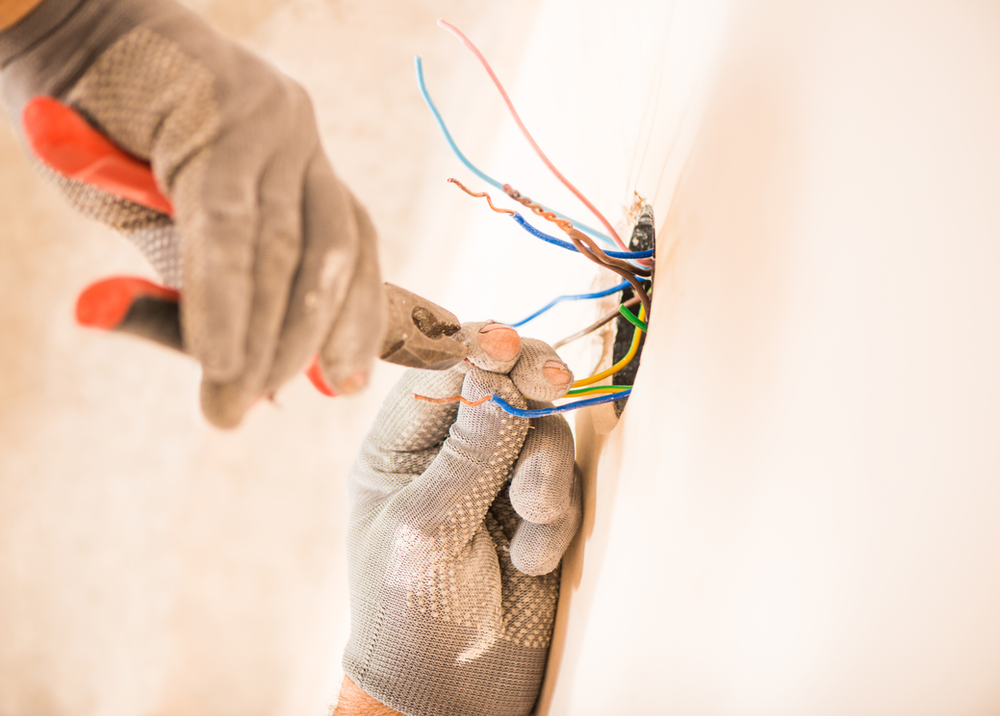There are many potential electrical hazards in any home. Some of these electrical hazards are hidden, and some are in plain sight. The most common risks include overloaded outlets, extension cords that are not properly grounded, and damaged or frayed wires. These hazards can all lead to severe injuries or even death. According to the U.S. Fire Protection Association, electrical fires accounted for $1.5 billion in property damage each year from 2015-2019, with an average of 46,700 home fires and 390 civilian deaths yearly. That is why it’s crucial to be aware of your home’s electrical hazards so you can avoid them. Have a qualified home inspector check your home to ensure it is safe from these dangers.
What classifies an electrical hazard?
Check your home for some of the electrical hazards like the following:
1. Damaged, defective, or worn electric wires
Defective, worn, or corroded electrical wires increases the risk of power surges and possible electrical fires. It’s crucial to ensure that your home wiring conforms to safety standards. Have a certified electrician inspect your wiring to check for electrical hazards like loose connections in switches, receptacles, extension cords, or wires worn out, overheated, or chewed by rodents. Also, watch out for wire insulation that is cracked or pierced from heat, corrosion, or age. Throw out frayed and damaged wires and extension cords, and don’t try to patch them with tapes. If you see signs of faulty wiring, you may need to rewire your home, especially if it’s an older house.
2. Outlets and electrical appliances close to a water source
Water and electricity are basic household needs, but accidents happen when placed close to each other. Water conducts electricity, so you must be extra careful with electrical appliances. Some helpful tips:
Install plugs and electrical outlets safely from water sources in the kitchen, bathrooms, etc.
Never use appliances like hairdryers, shavers, radiators, radios, portable lamps, and other devices in the sink, bath, jacuzzi, or near the swimming pool.
Make sure your outdoor appliances won’t come in contact with water.
Always remember to dry your hands before picking up or touching appliances.
Use rubber sole shoes if you are using electricity in wet areas.
3. Lightbulbs
Lightbulbs are commonly used in homes and look harmless, but lightbulbs can cause electric shocks if not appropriately handled. Minimize the risk of shocks from lightbulbs by keeping them away from flammable materials like a curtain, drapes, etc. Don’t forget to turn lightbulbs off and ensure your hands are dry before replacing them.
4. Covered electrical wires and cords
Never cover wires and cords. Wires irradiate heat, so make sure you give them enough room for ventilation. If you cover wires with carpets or other flammable objects, the electrical wires could overheat and cause a fire.
5. Extension cords instead of permanent wiring
Using extension cords is a common practice in most homes. They are convenient and might not seem dangerous if you follow safety rules. However, they could be hazardous if someone trips and falls from them. Here are some tips:
Fix the extension cords so no one would accidentally stumble on them
Cover the unused receptacles with plastic covers
Don’t use too many devices at the same time
Always inspect the extension cords for damage, fraying, or bends.
6. Inquisitive Children
If there are children at home, you have to exercise more precautions. Kids are naturally curious and tend to pull appliances from the plugs or plug objects into outlets. Minimize the hazard by covering electrical outlets with plastic covers and tucking electrical cords out of reach of children.
7. Pouring water on fires caused by electricity
In case of an electrical fire, never pour water to stop it because it will start for whatever reason, don’t try to use water, as this will only fuel the fire. Use a fire extinguisher. Put it someplace that’s easily accessible in case of emergency.
8. Overloaded circuits
Overloading circuits can occur when too much electricity is flowing through the wires. This can happen if there is a sudden power surge or you plug too many appliances into one outlet. Overloaded circuits can cause fires.
9. DIY electrical work
You should avoid doing Do-It-Yourself electrical work unless you’re a certified electrician. Always contact an electrician to install wirings and fix electrical problems in your home.
10. Live wire that produces electric shock and burns
Use a ground fault circuit interrupter called a GFCI to protect you or your family from severe electrical shocks.
Bottom Line
Most homes have electrical hazards, but by being aware of them and taking steps to correct them, you can help keep your family safe from harm. This is why a home inspection is crucial before you buy or sell a house. First, a home inspector can identify any potential problems with the property that you may not be able to see. Second, an inspection can give you peace of mind knowing that the property is in good condition.
Call us now for a home inspector, home inspection, home safety issues. We’ll help you identify any electrical hazards in your home.




